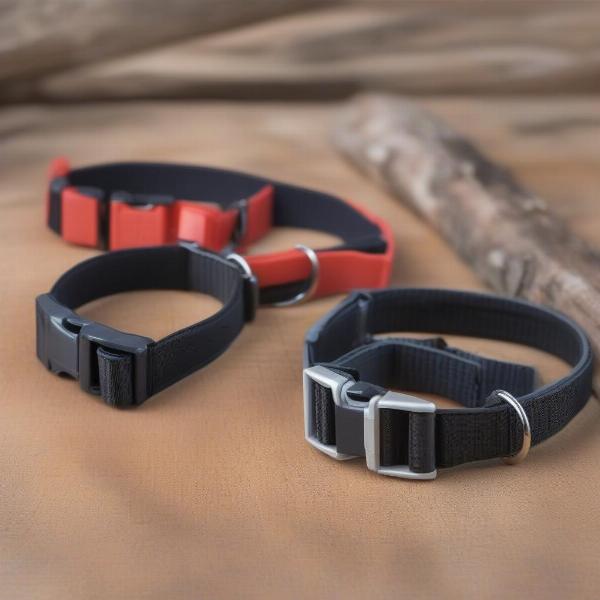Finding the best bark collar for a stubborn dog can be challenging. You want something effective, but also safe and humane. This article will guide you through the different types of bark collars available, helping you choose the right one for your furry friend. We’ll cover everything from ultrasonic and vibration collars to static correction collars, discussing the pros and cons of each. We’ll also address common concerns and offer tips for successful training.
Understanding Your Stubborn Dog’s Barking
Before choosing a bark collar, it’s crucial to understand why your dog barks excessively. Is it boredom, anxiety, territoriality, or something else? Identifying the root cause can help you address the underlying issue and make training more effective. Sometimes, a bark collar alone isn’t the solution. Combining it with positive reinforcement training, behavioral modification, and plenty of exercise can yield the best results.
Types of Bark Collars for Stubborn Dogs
There are several types of bark collars on the market, each working differently. Understanding the mechanisms of each type will help you choose the best fit for your dog’s temperament and barking habits.
Ultrasonic Bark Collars
These collars emit a high-pitched sound that dogs find unpleasant, interrupting their barking. While generally considered humane, some dogs may become desensitized to the sound over time.
Vibration Bark Collars
Vibration collars deliver a vibrating pulse when the dog barks. This provides a sensory interruption, deterring the barking behavior. These collars are often a good starting point for dogs sensitive to sound.
Static Correction Bark Collars (Shock Collars)
Static correction collars deliver a mild electric pulse when the dog barks. While effective for some stubborn dogs, it’s important to choose a collar with adjustable intensity levels and use it responsibly. Incorrect usage can cause fear and anxiety.
 Types of Bark Collars
Types of Bark Collars
Choosing the Right Bark Collar: Factors to Consider
Choosing the right bark collar involves considering your dog’s size, breed, temperament, and the severity of their barking.
- Size and Breed: Ensure the collar fits comfortably and is appropriate for your dog’s size and breed.
- Temperament: A sensitive dog might respond well to vibration, while a more stubborn dog might require a different approach.
- Barking Triggers: If your dog barks primarily at specific triggers, consider combining a bark collar with training to address those triggers.
Training Tips for Using a Bark Collar Effectively
A bark collar isn’t a magic fix. It’s a training tool that should be used in conjunction with positive reinforcement and consistency.
- Start Gradually: Introduce the collar slowly, allowing your dog to acclimate to it.
- Positive Reinforcement: Reward quiet behavior with praise and treats.
- Consistency: Use the collar consistently to reinforce the desired behavior.
- Consult a Professional: If you’re unsure which collar to choose or how to use it effectively, consult a certified dog trainer or veterinarian.
Conclusion
Choosing the best bark collar for a stubborn dog requires careful consideration and responsible usage. By understanding the different types of collars, considering your dog’s individual needs, and implementing effective training techniques, you can help your furry friend develop better barking habits and enjoy a more peaceful home environment. Remember to prioritize positive reinforcement and consistency for the best results.
FAQ
- Are bark collars cruel? When used responsibly and humanely, bark collars can be a safe and effective training tool. However, misuse can cause fear and anxiety.
- What type of bark collar is best for a sensitive dog? Vibration collars are often a good starting point for sensitive dogs.
- Can I use a bark collar on a puppy? Consult with a veterinarian before using a bark collar on a puppy.
- How long should I use a bark collar? Bark collars should be used as a training tool and not a permanent solution.
- What if my dog becomes desensitized to the collar? You may need to try a different type of collar or adjust the settings.
- Is it okay to leave a bark collar on all the time? No, bark collars should not be left on all the time. Follow the manufacturer’s instructions for safe usage.
- Should I consult a professional before using a bark collar? If you are unsure which collar to choose or how to use it, consult with a veterinarian or certified dog trainer.
Related Articles on ILM Dog
ILM Dog is your go-to resource for expert advice on dog breeds, health, training, nutrition, grooming, and much more. We offer comprehensive guides and product recommendations to help you provide the best possible care for your canine companion. Whether you’re a seasoned dog owner or just starting out, ILM Dog is here to support you every step of the way. Contact us at [email protected] or +44 20-3965-8624 for personalized advice. Visit us at ILM Dog for more information on how to enrich your dog’s life!